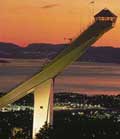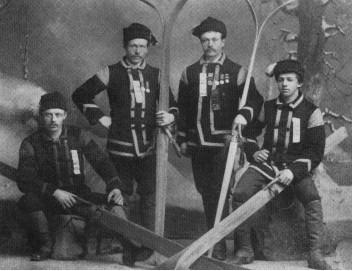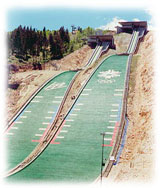The History and Overview of Ski Jumping

http://www.norvegiaviaggi.com/programma_invernale/oslo.html
Ski jumping is a sport that acutally has roots that trace back to
America, with emphsis to the midwestern states of Illinois, Wisconsin,
Minnesota, and Michigan. The sport of flying on skiis itself goes
back to the 1880's, nearly 10 years before the first recorded distance
record was set! At a distance of 37 feet, Mikkel Hemmestvedt
would make the record books with much pride. A picture of the
Hemmestvedt brothers taken over 110 years ago is below (Ski Jumping
Centeral.)

http://www.skijumpingcentral.com/history.htm

http://www.skijumpingcentral.com/history.htm
Skiing was not a very popular sport until after World War II; however,
ski jumping was what most thought of to be skiing. As early as
the 1930's, temporary jumps were erected in Chicago's Soldier Field,
what is today the football stadium for the Chicago Bears, for
spectators and used shaved ice for snow. Typically, the shaved
ice came from the nearby mountains by the truckload (Ashburner.)


http://www2.arnes.si/~ssljmd7s/sbsx/foto1/page_10.htm
Ski jumps
usually consist of a steep-declining hill that has the trees removed,
as can be seen in the picture above. The initial portion of the
jump is usually man-made to provide enough speed to go off it. In
the middle there is a flat portion with a lip that the jumper will use
to take flight. Following this is a steep decline recessed into
the hill, with marks to judge how far the jumper flies. The jump
is well rounded to provide as little disturbances to the jumper as
possible; if there was a bump in the hill it would send the jumper into
pre-jump or post-jump flight. In order to obtain maximum flight,
the jumper leans forward flat with his skiis to make it as far down the
hill as is possible. An olympic ski jump can be seen below.




http://www.skijumpingcentral.com/photos.htm
http://176-m236.summer.com/schools/sss/physics/physics12/Kinematics/ski_jumping_physics.htm
Index
The History and Overview of Ski Jumping
The Physics Behind Ski Jumps
Using Physics to Aid the Jumper
Improvements to Ski Jumping
Bibliography
Index
The History and Overview of Ski Jumping
The Physics Behind Ski Jumps
Using Physics to Aid the Jumper
Improvements to Ski Jumping
Bibliography